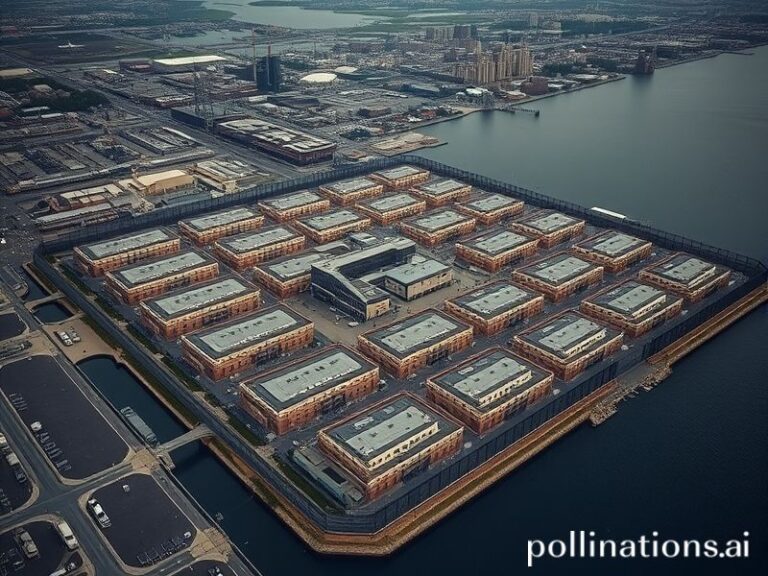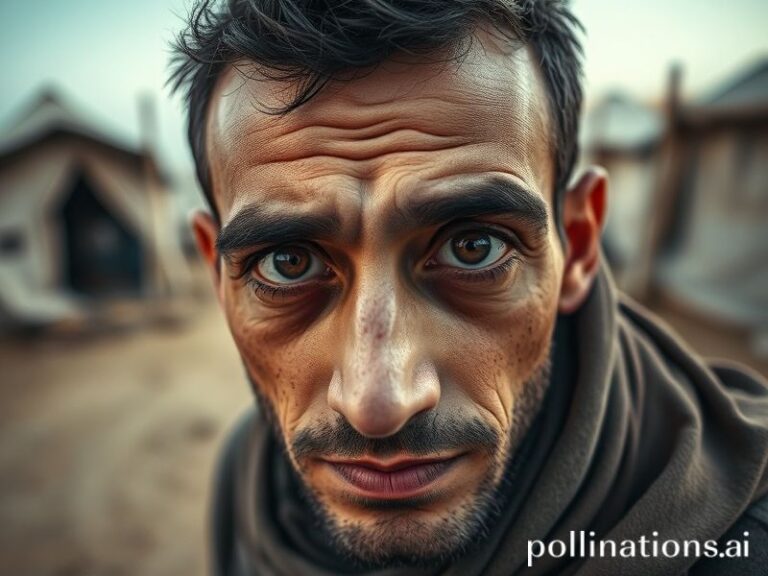palestine
The Eternal Press Conference
An International Dispatch on Palestine, or How to Hold a 75-Year-Long Vigil for a Map
By the time you finish reading this sentence, another minister in some distant capital will have declared that the “two-state solution remains the only viable path.” Meanwhile, the cartographers of the Levant have long since given up and switched to origami; the paper folds into one state, two states, zero states, and—if you squint—something that looks suspiciously like a QR code. Welcome to Palestine, the world’s longest-running geopolitical séance, where everyone keeps asking the dead peace process to rap once more on the table.
Globally, the word “Palestine” functions as a Rorschach test. To Turtle Bay diplomats it is a perennial agenda item wedged between the budget for fluorescent lightbulbs and the cafeteria’s new vegan shawarma. To Washington think-tankers it is a lucrative subscription service: pay monthly, receive talking points, ignore auto-renewal. To Beijing, it is a convenient morality coupon—redeemable whenever someone mentions Uyghurs. And to Elon Musk, it is just another open-source repository where one can upload, fork, and abandon code.
Yet the ripple effects refuse to stay bottled in the Eastern Mediterranean. When Ramadan clashes with Passover and Easter under the same crescent moon, airlines from Bangkok to Boston preemptively cancel flights the way Midwesterners cancel school at the first flake of snow. Oil traders in Singapore price in a “Gaza risk premium” even when the strip is quieter than a Swiss canton on a Sunday. Meanwhile, TikTok’s algorithm—equal parts oracle and arsonist—delivers 30-second dispatches of teenage despair wrapped in trending audio. The platform’s AI apparently believes the most therapeutic soundtrack for airstrikes is a sped-up remix of “Let It Go.”
Europe, still auditioning for the role of “adult in the room,” manages to look both stern and constipated. Brussels threatens to label Israeli wines from the West Bank, a sanction so fearsome that connoisseurs in Bordeaux have already stockpiled crates labeled “Product of Judea, may contain traces of occupation.” London oscillates between outlawing BDS and outlawing criticism of outlawing BDS, proving once again that British foreign policy is just Monty Python with worse catering. Berlin, haunted by its own historical blooper reel, outlaws the keffiyeh on certain days lest it trigger flashbacks to the Sudetenland. Somewhere, Kafka files a copyright claim.
The Arab states, having tired of rhetorical thunder, now treat Palestine like a family heirloom they can’t sell on eBay. Riyadh dangles normalization in exchange for a semiconductor plant—because nothing says “justice” like 3-nanometer chips. Abu Dhabi builds solar farms in the Negev and calls it coexistence; Amman quietly calculates how many more Palestinian citizens it can absorb before tipping into a constitutional fondue. Meanwhile, Doha keeps the lights on for Al Jazeera, ensuring that every bombing run has its own theme music and slow-motion replay.
In the southern hemisphere, Brazil’s president quotes Corinthians—both the epistle and the football club—while Argentina wonders if recognizing Palestine will finally deliver Messi a World Cup rematch. South Africa files ICJ briefs with the zeal of a graduate student who’s just discovered footnotes. And every African Union summit ends with a motion to “send a fact-finding mission,” which is bureaucratic Swahili for “we’ll think about it after lunch.”
And then there are the Palestinians themselves—split between those holding power without a state and those holding a state without power. Gaza’s two million residents have become involuntary beta testers for humanity’s latest siege technologies: AI-guided drones, biometric turnstiles, and algorithmic calorie counts. The West Bank, meanwhile, is an archipelago of bantustans connected by hope and WhatsApp groups. East Jerusalemites navigate a municipal bureaucracy so Kafkaesque that even Kafka would ask for an extension.
So what is the broader significance of this tragicomedy? Simply that Palestine has become the planet’s moral junk drawer: every nation tosses in its contradictions and slams it shut. Climate summits end with pledges to “keep 1.5 alive” but can’t keep 2.3 million Gazans above sea level—politically or literally. Tech conferences celebrate borderless innovation while Israeli facial-recognition startups raise Series C rounds to perfect border cruelty. And the rest of us doom-scroll, double-tap, and donate our guilty $5, confident we’ve done our part.
In the end, Palestine is not merely a place; it is a mirror reflecting our collective talent for endless discussion punctuated by periodic explosions. It is the international community’s favorite tragic opera—performed nightly, reviewed daily, and never allowed to reach its final act. Curtain calls are strictly forbidden; somebody might have to change the set.







